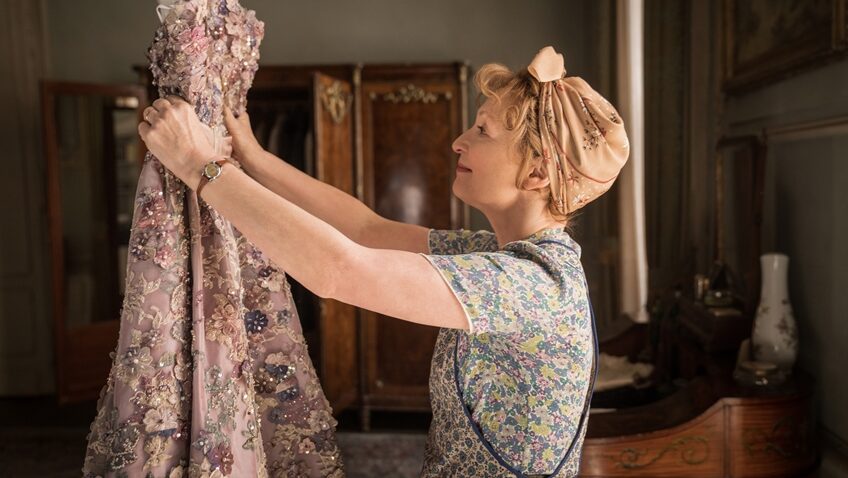Joyce Glasser reviews Mrs Harris Goes to Paris (September 30, 2022) Cert PG, 115 mins.
You have to be a real cynic not to fall under the spell of the latest adaptation of Paul Gallico’s 1957 novella of the same title, although director Anthony Fabian and his three co-writers have made several puzzling choices and changes. For one, the updated happy ending turns the message of borderless love to one of cross-border commerce.
Where Fabian hits the jackpot is in casting Lesley Manville as the eponymous charwoman turned fashionista, whom Gallico describes as a “small, slender woman with apple-red cheeks, greying hair and shrewd, almost naughty little eyes.” Bingo.
A cleaner who works ten-hour days, six days a week “approaching the sixties” in 1957 would probably look like a well-off woman of 66 – Manville’s age today. With dowdy clothes, cockney accent, chipper personality, and a knack for sewing and mending that her clients find useful, Manville embraces the cleaner from Battersea. So much so that it makes you wonder if Fabian saw Manville as the aloof, controlling manager of an exclusive 1950’s design house in The Phantom Thread, and bet that she could play her exact opposite character here.
It is 1957 London and Ada Harris, a cleaning lady widowed in World War II, becomes obsessed with Lady Dant’s (Anna Chancellor, having a blast) Christian Dior gown. When Mrs Harris opens the penny pinching client’s wardrobe to tidy it, it is love at first sight despite the shocking price of £500. Practical, though with a penchant for portents, Mrs Harris does her sums and sets out to make her dream a reality.
The writers make her task easier than Gallico envisaged. Out of the blue she receives a long overdue war widow’s pension and a surprise from an attractive neighbour (Jason Issac) at the dog track who witnesses Mrs Harris bet her savings on a dog whose name is “Haute Couture” (or, as she pronounces it, Howt Cowter).

Mrs Harris’s first time in an airplane takes her to Paris also for the first time, where the cleaning lady charms almost everyone she meets (including a socialist drunkard who points out the city wide rubbish collector’s strike, reminding us of the class divide). Mrs Harris also touches, if not changes the lives of everyone she encounters.
One person who does not give in easily to Mrs Harris’ charm is Claudine Colbert (Isabelle Huppert), who runs Mr Dior’s flagship workshop and showroom with an iron fist. Appalled at what her posh clients will think of this frumpy lower class cockney in their showroom, Colbert encourages her to try a department store. But the sight of Mrs Harris’ rolls of cash attract finance director André Fauvel (Lucas Bravo) who welcomes cash when all the rich clients drag out payments on account.
And when the debonair Marquis de Chassagne (Lambert Wilson) intercedes offering Mrs Harris his arm, she proudly takes her place in the front row.
Each beautiful dress trumps the one that came before, but when Dior’s top model Natasha (Alba Baptista) silences the room in Temptation, Mrs Harris marks her card. When she is pipped at the post by a dishonest, snooty regular customer, Mrs Harris buys her second choice and makes the most of it at the daily fittings that ensue.
Unlike in the book where Colbert quickly grows to admire Mrs Harris, wishing her own downtrodden husband were equally assertive, in the film Colbert remains an adversary almost until the end. This is a smart move because most other obstacles quickly melt away as Mrs Harris works her magic on Paris. Just as she tidied up the messy homes of her London clients, so Mrs Harris tidies up the financial and social lives of her new Parisian friends.

Mr Fauvel offers Mrs Harris a room in his home and Natasha finds the time to drive Mrs Harris to the bachelor’s messy apartment which the two women clean up in no time. Mrs Harris instantly sees that André and Natasha are in love with one another but, neither could ever imagine the other would feel the same. Fauvel cannot imagine that the beautiful Dior model who is the “it” girl of Paris would like nothing better than to cook dinner for her family and stay in reading Sartre’s Being and Nothingness. Natasha cannot imagine that the brilliant, workaholic Fauvel would be interested in existential philosophy, let alone in a silly model.
Life is not entirely a fairy tale, and there are scenes of real potency where social class is not so easily forgotten. Wined and dined by the charming Marquis, Mrs Harris is devastated when he confesses that she reminds him of “Mrs Mops,” the cleaner at his British boarding school. And the fate of the dress in London, where Mrs Harris has nowhere to wear it, but a social climbing starlet does, not only points out how the poor pay more, but the dangers of filmmakers fiddling with an author’s ending. It is a nonsense that the green gown that we saw being made-to-measure for petite Mrs Harris would fit the buxom, curvaceous starlet.
Unfortunately, too, though the following comment contains a spoiler, Mrs Harris’s revolutionary fervour defies credibility. When she sees the hard working dressmakers getting the sack, Mrs Harris organises a strike and then, to ensure that everyone has a brighter future, helps save the House of Dior from financial ruin.
And in a film that boasts almost perfect casting (Lucas Bravo is the sexy chef in Netflix’s Emily in Paris but even better here) why Ms Baptista? Though very pretty, she lacks the striking chiselled features, height, long limbs and runway stride of a Dior model. Baptista who is no taller than Manville lacks a runway model’s attitude.
More attention to detail and subtlety would have made this film a classic. But if you are hoping to have fun, a bit of romance, and feel that life really can begin at sixty, it’s mission accomplished.




